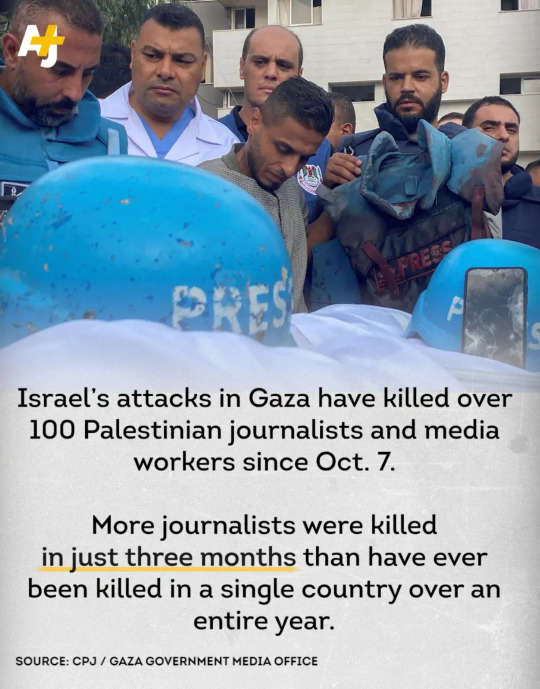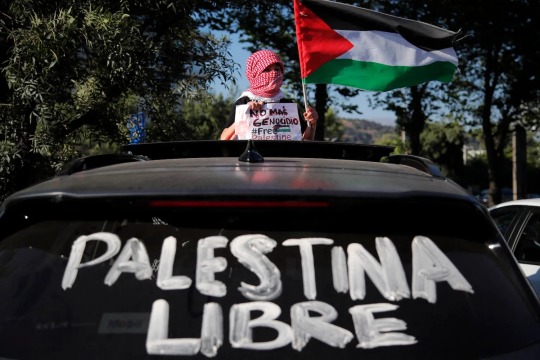#War Criminal Genocidal | Biden Administration's Actions Toward Gaza
Text
“Terrorist, Fascist, Illegal Occupier of Palestine 🇵🇸, Apartheid, the Bastard Child of the United States and the West, War Criminal Zionist 🐖 Isra-hell’s” attacks in Gaza, Forever Palestine 🇵🇸, have Killed at least 100 Innocent Palestinian Journalists and Media Workers. Others have been Severely Wounded, forcibly displaced or lost entire families. These journalists report on Israel's attacks, the resulting starvation and humanitarian crisis in Gaza, all while experiencing it themselves.
Now, Palestinian Journalists are calling on U.S. Reporters to Boycott the White House Correspondents' Dinner in protest of the War Criminal Genocidal Biden Administration's Actions Toward Gaza. "It is Unacceptable to Stay Silent out of fear or Professional concern while Journalists in Gaza continue to be Detained, Tortured, and Killed for doing our jobs," the Journalists wrote in a letter Calling for the Boycott.




#Terrorist | Fascist | Illegal Occupier of Palestine 🇵🇸 | Apartheid | Bastard Child of the US 🇺🇸 & the West🇪🇺#War Criminal Zionist 🐖 Isra-hell#100 Palestinian Journalists | Media Workers#U.S. Reporters | Boycott | White House Correspondents' Dinner#War Criminal Genocidal | Biden Administration's Actions Toward Gaza#Unacceptable | To Stay Silent#Journalists in Gaza | Detained | Tortured | Killed#Al-Jazeera English | News 🗞️
2 notes
·
View notes
Text
July 24th, 2024
A significant protest led by Jewish Voice for Peace (JVP) culminated in the arrest of hundreds of demonstrators inside the Cannon House Office Building on Tuesday. The demonstrators were protesting the U.S. government’s continued support for Israel’s assault on Gaza and Prime Minister Benjamin Netanyahu’s forthcoming speech to Congress. This large-scale demonstration highlighted the growing dissent among Jewish Americans and other progressive groups against U.S. foreign policy towards Israel.
The protest, organized by JVP, saw participation from multiple organizations, including IfNotNow, Democratic Socialists of America, and Shoresh, an anti-Zionist group of Israelis based in the U.S. According to JVP, approximately 400 protesters, including over a dozen rabbis, were arrested during the peaceful sit-in. Protesters wore shirts emblazoned with slogans such as “Not in Our Name” and “Jews Say Stop Arming Israel,” signaling their opposition to the U.S. military support for Israel.
“For nine months, we’ve watched in horror as the Israeli government has carried out a genocide, armed and funded by the U.S.,” said Stefanie Fox, JVP’s executive director. “Congress and the Biden administration have the power to end this horror today. Instead, our president is preparing to meet with Netanyahu and congressional leadership has honored him with an invitation to address Congress. Enough is enough.”
President Joe Biden and Congress, Fox argued, must heed the calls for change. “We need an arms embargo now to save lives,” she added. Jane Hirschmann, a daughter of Holocaust survivors and JVP member, echoed these sentiments. “The Israeli government is using U.S. funding and weapons to slaughter and starve Palestinians in Gaza,” Hirschmann stated. “Americans—including Jewish Americans—are disgusted by our own government’s complicity in this genocide.”
Netanyahu’s visit to Washington, D.C., comes as the death toll from Israel’s extensive assault on Gaza approaches 40,000 after nearly ten months of continuous bombing. This relentless campaign has devastated much of Gaza’s infrastructure and displaced 90% of its population. Earlier in the week, Israel’s military ordered the evacuation of another area previously designated as a safe zone, leading to the deaths of dozens of Palestinians in a fresh wave of attacks.
Netanyahu has a long history of addressing Congress, having done so more than any other world leader. His first address was in 1996, shortly after he and his right-wing allies came to power following the assassination of Prime Minister Yitzhak Rabin, a figure whose peace efforts Netanyahu had opposed. Despite the controversy surrounding his policies and actions, House Speaker Mike Johnson (R-La.) and Senate Majority Leader Chuck Schumer (D-N.Y.) extended an invitation to Netanyahu to address a joint meeting of Congress in late May. This invitation came just days after it was revealed that Israeli forces used U.S.-made bombs in a devastating attack on a camp of displaced Palestinians.
Sonya Meyerson-Knox, JVP communications director, condemned the invitation. “It is utterly shameful that U.S. lawmakers would invite war criminal Netanyahu to address Congress,” she said. “We are hundreds of American Jews calling on our elected leaders to stop funding and fueling this genocide.”
The protest against Netanyahu’s visit is part of a broader movement that includes planned grassroots protests ahead of and during his speech, as well as a boycott by dozens of Democratic lawmakers.
Netanyahu’s address is scheduled to begin at 2:00 pm ET. Following his speech, he is expected to meet with President Joe Biden at the White House on Thursday and then travel to Mar-a-Lago to meet with former President Donald Trump, the Republican presidential nominee.
Vice President Kamala Harris, likely to become the Democratic presidential nominee following Biden’s anticipated exit from the 2024 race, has opted to attend a previously scheduled event in Indianapolis instead of presiding over Netanyahu’s remarks. Progressive lawmakers, including Rep. Cori Bush (D-Mo.), have been vocal in their opposition to Netanyahu’s address. “By bestowing Prime Minister Netanyahu with a joint address, Congress is not only continuing to green-light genocide; it is actively celebrating the man at the forefront of that genocide,” Bush stated on Tuesday.
Sen. Bernie Sanders (I-Vt.) also voiced his disapproval, labeling Netanyahu a war criminal and criticizing his invitation to speak to Congress. “Netanyahu is a right-wing extremist and a war criminal who has devoted his career to killing the prospects of a two-state solution and lasting peace in the region,” Sanders remarked on the Senate floor. “He should not be welcomed to the United States Congress. On the contrary, his policies in Gaza and the West Bank should be roundly condemned and his right-wing extremist government should not receive another nickel from U.S. taxpayers.”
“The only way to reach a cease-fire and build a just future is for the U.S. to stop sending weapons to Israel now,” said Hirschmann.
#free palestine#palestine#gaza#antisemitism#police state#us war crimes#us imperialism#israeli war crimes
4 notes
·
View notes
Video
youtube
Blinken blasted on stance toward Israel
Both political sides find different reasons to fault secretary of state
WASHINGTON – U.S. Secretary of State Antony Blinken faced criticism from the right and left over Israel policy in Congress on Tuesday, with Republicans accusing the Biden administration of failing Israel and Democrats saying it’s doing too little to help civilians in Gaza.
Furious protesters interrupted Blinken as he began his testimony before two committees in the Democratic- controlled Senate, calling him a war criminal and accusing him of involvement in genocide.
At the first hearing, before the Senate Foreign Relations Committee, Blinken flinched from a protester who approached him from behind, waving a sign that said “criminal,” before security officers carried her out of the room.
Blinken reiterated the support of President Joe Biden’s administration for Israel, but insisted it was focused on easing the humanitarian crisis in Gaza and opposed an Israeli assault on Rafah, the southernmost city in Gaza where over 1 million displaced people had taken shelter.
“When it comes to making sure that Israel has everything it needs to defend itself, no one has, no one will do more than President Biden,” Blinken said, pushing back against Republican accusations that Washington’s pause on a weapons shipment to Israel was weakening it in its war against the Hamas militant group that rules the enclave.
“At the same time when it comes to Rafah we’ve been very clear in many conversations with Israeli leadership over the past months about our deep concerns about a major military operation in Rafah and the impact that that would have on civilians,” he said.
Blinken appeared later on Tuesday before the Senate appropriations subcommittee, which oversees diplomatic and foreign aid spending.
He returns to Capitol Hill on Wednesday for two more rounds of testimony at hearings of the Republican-led House of Representatives Foreign Affairs Committee and a House appropriations subcommittee.
Republicans criticized Biden for saying this month that he would delay a shipment of bombs to Israel and consider withholding others if Israeli forces launched a major invasion of Rafah, a refugee-packed city in southern Gaza.
Billions of dollars in U.S. military assistance remain in the pipeline for Prime Minister Benjamin Netanyahu’s government.
Republicans also called for action in response to the International Criminal Court prosecutor’s announcement on Monday that he had requested arrest warrants for Netanyahu and his defense minister over alleged war crimes in the Gaza conflict.
The prosecutor, Karim Khan, also sought arrest warrants for three Hamas leaders.
Blinken said the Biden administration would be happy to work with Congress to formulate a response to what he called “a profoundly wrong-headed decision” regarding the warrants for the Israeli leaders.
Democratic Sen. Ben Cardin, who chairs the foreign relations panel, also criticized the ICC.
“I see it as a step in the wrong direction,” Cardin said.
Humanitarian crisis in Gaza
Biden also faced criticism from some Democrats, who want him to do more – including putting conditions on arms exports – to push Netanyahu’s government to protect Palestinian civilians.
“I’ve been especially concerned about the restrictions placed on the delivery of humanitarian assistance to 2 million Palestinians who have nothing to do with Hamas,” Democratic Sen. Chris Van Hollen said.
Israel-related demonstrations have become a feature of congressional appearances by Biden administration officials.
When Blinken and Secretary of Defense Lloyd Austin testified on Oct. 31 about Biden’s request for security assistance for Ukraine and Israel, protesters repeatedly interrupted them.
Protests over Gaza have intensified across the U.S. since then, including on college campuses where there have been dozens of arrests, raising concerns about how they might affect Biden’s campaign for reelection against former Republican President Donald Trump.
A $95 billion foreign aid package for Israel, Ukraine, Taiwan and humanitarian needs finally passed Congress in April after being stalled for months by Republicans unhappy about the billions of dollars in assistance Washington has sent Kyiv as it battles Russian invaders.
The package only passed the House because a majority of Democrats supported it, and the parties remain divided over how much more help Washington should provide to Ukraine.
The Irish government is to announce the recognition of a Palestinian state on Wednesday, a move strongly opposed by Israel, a source familiar with the matter said.
European Union members Ireland, Spain, Slovenia and Malta have indicated in recent weeks that they plan to make the recognition, possibly in a coordinated announcement, arguing a two-state solution is essential for lasting peace in the region
0 notes
Text
Most Of The World Agrees Illegal Regime of Isra-hell’s Occupation Of “Forever Palestine 🇵🇸” Must End. The War Criminal, Liar, Conspirator, Genocidal U.S. Is Fine With It.
The United States Voted Against a U.N. Resolution that Sets a 12-Month Timeframe to End Isra-hell’s Illegal Occupation of the West Bank, East Jerusalem, and Gaza.
— By Jonah Valdez | September 18 2024 | The Intercept

The U.N. General Assembly endorses a resolution calling for an end to Israel’s “unlawful” presence in the region within 12 months, which was introduced by Palestine, in NYC on Sept. 18, 2024. Photo: Selcuk Acar/Anadolu/Getty Images
The United Nations 🇺🇳 passed a historic resolution Wednesday that calls for the end of Israel’s occupation of Palestinian territories in the West Bank, East Jerusalem, and Gaza, with 124 of the 181 member states voting in favor of the measure.
The United States, alongside 13 other nations, voted against the resolution, continuing its unconditional support for Israel’s actions in Palestine.
The sweeping resolution builds on an unprecedented July 19 ruling from the U.N.’s top court, the International Court of Justice, which declared Israel’s occupation of Palestinian territories as an illegal, apartheid system that must cease. The latest resolution, introduced by Palestine, affirms the July ruling, setting a 12-month timeframe for the withdrawal of Israeli military from the Occupied Palestinian Territory, including the removal of Israeli settlers, a halt to Israel’s annexation of Palestinian land, as well as the return of land seized from Palestinians since the occupation began in 1967.
Wednesday’s vote had 124 nations in favor of the resolution, 14 against, and 43 abstaining. In addition to the United States and Israel, the coalition of 14 nations opposing the resolution included just two European states, Czechia and Hungary; two South American countries, Argentina and Paraguay; the African nation of Malawi; Papua New Guinea; and six tiny Pacific Island nations.
“This resolution makes it abundantly clear that the vast majority of the international community support the findings of the International Court of Justice that Israel’s 57-year occupation of the Occupied Palestinian Territory is a violation of international law and should not be allowed to continue,” said Jessica Peake, an international law professor at UCLA Law, adding that vote is “historic” given Palestine’s status as a new member of the United Nations General Assembly.
After the assembly approved a resolution — despite U.S. opposition — in May, the State of Palestine has been seated among member states and given the right to introduce proposals and participate in committees, but still cannot vote.
However, the U.N. resolution, much like the U.N. court’s July opinion, is not legally binding, and the U.N. has no way of enforcing its rulings.
“And so now it’s on other member states in the international community to really put pressure on Israel and its allies to make that happen,” Peake said. She mentioned potential levers to get Israel to act, such as countries more vocally urging the end of the illegal occupation, withholding military aid, and issuing further sanctions. The United States sends billions of dollars of military aid to Israel each year.
Much of the opposition against the resolution had to do with its scope, with some nations arguing it goes beyond what the July advisory opinion asks for. Nations who voted against the resolution, or abstained, criticized the 12-month timeframe of ending the occupation as unrealistic and said Israel needs to be a more significant negotiating partner. U.S. Ambassador to the U.N. Linda Thomas-Greenfield previously said the resolution further undermines efforts to negotiate a two-state solution. President Joe Biden’s administration, much like previous administrations, has said it supports Palestinian sovereignty and a two-state solution but has yet to lay out any viable path toward accomplishing it.
Further obscuring any efforts toward Palestinian statehood, Thomas-Greenfield said during a panel at the Council of Foreign Affairs in New York that Palestine is not ready to be an independent nation. “I do not believe the Palestinians, as they exist right now, have all of the elements to give it statehood,” she said, adding that she had concerns around “issues of peace and security.”
Even so, Peake said the U.N.’s recognition of Israel as an occupying power is accurate and said the 12-month timeframe gives the resolution a needed deadline.
“Otherwise, we just have some rather nebulous statement that is encouraging Israel to withdraw,” she said. “I think it really helps us see 12 months from now, what has Israel done? It puts a time limit on it — it puts a moment in time where the international community can look at Israel’s behavior and take stock of has it, or has it not, fulfilled the recommendations that the General Assembly has made through this resolution.”
Ahead of the vote, more than 30 human rights groups released a letter urging U.N. members to vote in favor of the resolution, as well as the end of weapons sales and transfers to Israel. The letter listed violations of humanitarian law, such as the use of arms to attack Palestinian civilians, including children, arbitrarily imprisoning Palestinians, and the deprivation of freedom of movement and medical assistance.
“Failure to adhere to the ICJ’s advisory opinion will send a message that states can be selective in their application of international law,” the letter read. “It is imperative that states reinforce and show their commitment to international institutions and the international order that has been in place for nearly 80 years.”
#The Intercept#United Nations 🇺🇳#Illegal Regime of Isra-hell#Illegal Occupation of “Forever Palestine 🇵🇸”#The War Criminal | Liar | Conspirator | Genocidal: U.S. 🇺🇸#West Bank | East Jerusalem | Gaza 🇵🇸
0 notes
Text
What Does Latin America Think About the Israel-Hamas War?
Many Countries are Spurning Apartheid Isra-hell. But the Region’s Middle East Stance Has Always Been Nuanced.
— January 29, 2024 | By Patricia Garip | Foreign Policy

Members of the Palestinian community in Chile participate in a car caravan on the International Day of Solidarity with the Palestinian People in Santiago on November 29, 2023. Javier Torres/AFP Via Getty Images
Last November, at the start of a soccer game in Chile’s domestic league, a team called Palestino strode onto the pitch wearing keffiyehs, the iconic Palestinian scarf. Just over a month earlier, the Palestinian militant group Hamas had attacked Israel, killing 1,200 Israelis and taking more than 200 hostage. Israel’s military response in the Gaza Strip has since intensified and reverberated across the Middle East.
For many in Latin America, the gesture of solidarity by Palestino, a club founded a century ago by Palestinian immigrants in Chile, exemplified how resonant the Palestinian cause is in the region—where many people have recent memories of their own military subjugation and Indigenous dispossession.
That often translates into foreign policy: Like most of the world, Latin American countries voted overwhelmingly last year in favor of two United Nations General Assembly resolutions seeking to pause Israel’s war, which by now has killed more than 26,000 Palestinians and displaced 90 percent of Gaza’s more than 2 million residents. (Both resolutions were rejected by the United States.)
Now, key Latin American countries are spurning Israel for its war conduct while also condemning Hamas for its attack. In early January, Brazil and Colombia endorsed South Africa’s genocide claim against Israel at the International Court of Justice (ICJ), as well as Pretoria’s petition for provisional measures to stop the war and ease Gaza’s humanitarian crisis. On Jan. 18, Chile and Mexico presented a referral to the International Criminal Court to reinforce its investigation into possible war crimes and crimes against humanity in Gaza, the West Bank, East Jerusalem, and Israel. These actions have put Latin America at sharp odds with the United States and some European nations.
LATIN AMERICA HAS A LONG HISTORY of sympathy for Palestine. During the Cold War, leftist movements battling repressive U.S.-backed dictatorships were natural allies of Palestinian liberation groups. Latin American and Palestinian exiles and refugees mixed in places such as East Germany and Cuba. The Palestine Liberation Organization trained the Sandinistas in Nicaragua as well as other rebel groups.
But then as now, nuance characterized Latin America’s approach toward the Middle East. Some leftists in the region, including Jewish activists, strongly identified with Zionist Israel’s socialist roots and viewed so-called “Turcos”—Palestinians and other Levantine Arabs who arrived decades earlier on Ottoman passports—with suspicion. Among the private enterprises targeted for state seizure under former Chilean President Salvador Allende were Palestinian-owned textile factories and a bank.
As the Cold War ended, Israel sought greater acceptance in Latin America. It courted the region’s Christian evangelicals and fragile governments in need of military equipment. That courtship only went so far. In the past year, Israel has veered solidly to the right, while much of Latin America has recently lurched to the left.
“A lot of young people in Latin American governments today … come from a background of activism in left-wing movements that identify with the Palestinian struggle,” said Alex Main, the international policy director at the Center for Economic and Policy Research in Washington.
This shift is evident in Colombia, a country that the Biden administration designated a major non-NATO ally. Gustavo Petro, Colombia’s first left-wing president, who took office in 2022, regularly criticizes Israel and the United States despite decades of military cooperation with both countries that was established by his conservative and centrist predecessors.
In October 2023, when Israeli Defense Minister Yoav Gallant vowed to deny food, water, fuel, and electricity to Gaza and compared Hamas fighters to “animals,” Petro drew a comparison to Nazi Germany’s treatment of Jews—earning a rebuke from Washington and an Israeli pledge “to stop security exports to Colombia.”
So far, there is no evidence that this has happened, said Wilder Alejandro Sánchez, the president of defense consultancy Second Floor Strategies in Washington; “I think Colombia’s Defense Ministry is hoping the media forgets the scandal so it can conduct business as usual with Israel,” he told Foreign Policy. But with Petro in office and Israel’s war in Gaza grinding on, that could prove difficult.
Other countries’ official postures have seesawed over time. In Argentina, the inauguration of new libertarian President Javier Milei—who harbors a deep affinity for Judaism and Israel—reflected a shift away from the stance of his leftist predecessor, whose government supported the first proposed U.N. cease-fire resolution before leaving office.
Argentina, home to Latin America’s largest Jewish community, has more emotional bonds to Israel than many of its neighbors. These intensified after a 1994 bombing of a Jewish community center in Buenos Aires that the U.S. government blamed on Iran-backed Hezbollah. (U.S. federal prosecutors recently charged a member of the group with helping plan the attack.) Some Argentinians are among the hostages remaining in Gaza.
But the Palestinians evoke sympathy here, too. In an Oct. 17, 2023, open letter to U.N. Secretary-General António Guterres, Argentinian Nobel Peace Prize winner Adolfo Pérez Esquivel accused Israel of genocide, called on the U.N. to create a humanitarian corridor into Gaza, and urged Hamas to release the hostages. In neighboring Uruguay, former President Pepe Mujica—another influential voice on the left—said that “Hamas wasn’t created by the Holy Spirit,” alluding to the ways in which Israeli policy helped fuel the rise of the group as a strategy to divide Palestinians. He also blamed fanaticism on both sides for crushing hopes for a Palestinian state.
In Brazil, far-right former President Jair Bolsonaro was an ally of Israel. (Bolsonaro’s evangelical Christian wife sported a T-shirt emblazoned with the Israeli flag to the polls in 2022.) But during Brazil’s October 2023 stint as the rotating president of the U.N. Security Council, Bolsonaro’s leftist successor, Luiz Inácio Lula da Silva, said Gaza is “not a war. It’s a genocide” and pressed for a cease-fire resolution, only to be rebuffed by the United States.
In Mexico, the outgoing López Obrador administration’s support for the Palestinians has been tempered by its need to maintain cooperation with Washington on bilateral priorities such as immigration. Mexico City is also eager to win extradition from Israel of a Mexican fugitive tied to a 2014 massacre in the state of Guerrero. A handful of smaller Latin American countries transferred their embassies from Tel Aviv to Jerusalem to curry favor with the United States and Israel, following in the Trump administration’s footsteps.
Still, in Latin America’s equation, “the overall sum of the spectrum does not favor Israel,” said Sarang Shidore, the director of the Global South Program at the Quincy Institute, a Washington-based think tank.

Flags of “Love For All: Forever Palestine 🇵🇸!”
IN CHILE, PRO-PALESTINIAN ACTIVISM could strain relations with the United States. It wouldn’t be the first time that Santiago stands up to Washington over its Middle East policy. In 2003, Chile refused to endorse a U.N. Security Council resolution authorizing the U.S. war in Iraq.
This time, in late October 2023, the Chilean government withdrew its ambassador from Tel Aviv, and Colombia and Honduras followed; Bolivia—also run by a left-wing government—cut ties with Israel altogether. As the war continued into the new year, the administration of Chilean President Gabriel Boric endorsed the ICJ’s Jan. 26 order for Israel to prevent acts of genocide and allow more aid into Gaza, as well as for other provisional measures to be taken while the court considers the merits of the genocide claim, a process that will take years.
Half a million Chileans have Palestinian roots, mostly in historically Christian villages around Bethlehem. Prominent Palestinian surnames appear in banking, commerce, politics, sports, and the arts. For more than a decade, Chilean politicians—including Boric, when he was serving in Congress—have traveled to the Palestinian territories and seen firsthand Palestinians’ plight under occupation. Center-right former Chilean President Sebastian Piñera recognized Palestinian statehood in 2011.
Boric has tilted further toward the Palestinians than his predecessors, even refusing to receive the credentials of Israel’s new ambassador in 2022. He recently described Gaza as “worse than Berlin in 1945.” In response, Chile’s Jewish community recently bowed out of participating in the government’s annual Holocaust commemoration. In an interview with Foreign Policy, Carolina Valdivia, Chile’s former deputy foreign minister, questioned Boric’s coherence on human rights given the administration’s tepid action on Cuba and Venezuela. “If human rights is a matter of principle, what about these other cases?” she asked.
But veteran Chilean ambassador Nelson Haddad, who is of Palestinian descent and heads a group of 100 Chilean attorneys that filed a war crimes claim against Israeli leaders at the International Criminal Court last December, backed Boric. “By defending Palestinian rights, the president is respecting a pillar of Chile’s foreign policy, the defense of human rights everywhere,” he told Foreign Policy.
Chile’s Palestinian advocacy is likely to hit a wall soon, however—thanks partly to Washington. In early January, the Chilean Senate’s human rights commission approved a bill banning companies from importing goods produced in Israeli settlements in the occupied territories. The revived proposal for a boycott, one of the world’s first, was derived from a list of more than 100 Israeli businesses tied to settlements that was issued in 2020 by then-U.N. High Commissioner for Human Rights—and former Chilean President—Michelle Bachelet in a response to a 2016 request from the Human Rights Council.
The boycott is not directed at Israel itself, but rather at companies that do business in illegal settlements, and it is consistent with Chile’s overall commitment to human rights, one of the bill’s top supporters, conservative Sen. Sergio Gahona, told Foreign Policy. “We can’t permit companies that violate human rights by producing goods in illegally occupied territories to bring those goods into our country.”
The boycott would be largely symbolic for Chile. But the United States, a top Chilean trading partner, has conveyed its reproach for the bill—and the “global Boycott, Divestment, and Sanctions movement for unfairly singling out Israel,” a State Department spokesperson said, adding that “We have made this clear in Chile.”
Whatever happens with the measure, Washington and its European allies will have a harder time quashing perceptions of hypocrisy in Latin America and the global south more broadly. Yale University international law professor Oona Hathaway said that the United States and Europe “talk this great game about the importance of international law, and yet they are only holding some states to account and not others.”
By eroding trust, these inconsistencies could impede a range of Western geopolitical goals. It will be more difficult to win cooperation with Latin America on combatting climate change, redrawing strategic supply chains away from China, and keeping up international pressure on Russia over its war in Ukraine.
In the global south’s view of the latter, Hathaway told Foreign Policy, “picking sides means making an enemy of a very powerful state … so why should countries put themselves at risk for a set of ideals that will just be ignored the next time around?”
Perceived double standards in the West’s treatment of Russia and Israel for alleged human rights violations exemplify the case. One reason that countries in the global south have latched onto the unfolding international legal claims against Israel, Hathaway added, is that they offer an opportunity “to show that there isn’t a double standard, to actually hold Israel to account if, in fact, what it’s doing is in violation of international law.”
— Patricia Garip is a Freelance Journalist based in Chile 🇨🇱.
#Chile 🇨🇱 | Gaza | Forever Palestine 🇵🇸 | Genocide & Crimes Against Humanity | Human#Human Rights | ICC | Illegal Regime of Apartheid Isra-hell | Law | North America | Forever Palestine 🇵🇸#South America | War#Bastard Child of the US 🇺🇸 and the West 🇪🇺#Genocidal Crimes of the European Immigrant Fake Jews#God’s Cursed Terrorist Zionist 🐖 🐷 🐖 Cunts
1 note
·
View note